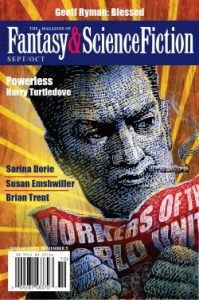Rich Horton Reviews Short Fiction: F&SF, Galaxy’s Edge, Uncanny, and Alfred Hitchcock
 F&SF 9-10/18
F&SF 9-10/18
Galaxy’s Edge 9/18
Uncanny 9-10/18
Alfred Hitchcock Mystery Magazine 9-10/18
The September-October F&SF includes a story from the daughter of one of our greatest writers (and an F&SF regular). “Suicide Watch” by Susan Emshwiller is a horrific near-future story in which suicides are a form of reality entertainment – the rights to witness them are sold to individuals who show up to the appointed location. The narrator is shown witnessing a few suicides – then he runs short of money. You can probably guess where this is headed, and it gets there effectively.
Brian Trent‘s “The Memorybox Vultures” does neat things with the idea of uploaded simulations of dead people, based on memories they recorded. Donna Lane works with these “quasints,” and she finds herself involved with a dangerous situation. A powerful politician is threatened by the potential release of the memories of a dead woman who had grown up next to him – and so his people go after Donna to try to find a way to get rid of the dead woman’s quasint. This is interesting enough, but Trent has another twist or two in store. Nice work.
The latest from the intriguing Japanese writer Yukimi Ogawa, “Taste of Opal“, opens with the narrator, Kei, telling of her sale, as a young child, to a group of merchants. It turns out her value is in her blood, which certain jewelers use to make blood opals. Those have great value – as medicine, or as something else. We follow Kei through several “owners,” and one woman who rescues her, and the story turns a bit stranger. I’m not sure it all quite works, but it is interesting and different.
As I’ve written before, the magazine Galaxy’s Edge has a certain tendency to feature very short and also humorous stories. Nothing wrong with this, though I’d like a bit more ambitious work mixed in. (They also feature more traditional adventure-oriented work, which I have found competent but rarely truly impressive.) The September issue is of a piece with most of the earlier ones, and my favorite story is again on the humorous side: Alex Shvartsman‘s “Small Fortune and the Perpetual Luck Machine“, in which Sylvia works at her Grandma’s Magic Pawn shop. She would like more responsibility, but Grandma thinks she is too prone to taking shortcuts. Sylvia’s latest misadventure is accepting the eponymous machine in pawn from a gnome named Nash (“the G is silent – the G in Gnome, that is”)… and at first things seem great when indeed the machine makes her lucky. But Grandma quickly realizes the moral consequences, and Sylvia needs to find a way to make the gnome take it back. Clever and amusing.
Uncanny‘s 24th issue is subtitled Disabled People Destroy Science Fiction, and it features stories from writers who identify as disabled. Not all the stories explicitly feature disabled characters, but most do, and if a few read more as well-intentioned homilies than stories, the best here are very fine indeed. Fran Wilde is as ever challenging and intriguing with “Disconnect“, about a woman whose bones and joints disappear from her body in her sleep (they are usually recoverable), and about her mentor, an older professor who is getting younger. William Alexander‘s “The House on the Moon” is about a girl on a field trip on the Moon, visiting a rich man’s crazy folly of a Castle, who stumbles on a strange treasure and is nearly killed by the man’s obsessions. Entertaining and oddly moving. The best story, though, is “A House by the Sea” by P.H. Lee, which imagines the successive surviving children of that basement in Omelas living in the title house. It’s beautifully written, and morally sharp. Le Guin’s original has been subject to multiple reimaginations, some quite effective, and this is one of the best of those.
One more story this month is of interest to SF readers, especially those connected to fandom, though it’s not SF. “Unity Con” is the latest of Kristine Kathryn Rusch‘s stories for Alfred Hitchcock Mystery Magazine about Spade, a Microsoft millionaire and a Secret Master of Fandom who helps conventions with financial issues, and Paladin, a young woman who investigates knottier problems, sometimes with Spade’s help. This time Paladin is at Unity Con, a convention intended to promote unity between the factions of fandom that were so noticeably divided by the Sad Puppy fiasco. There’s a dead body – of a fan and writer apparently modeled to an extent on Vox Day, and it looks like murder. Spade wants nothing to do with this mess, but is inveigled into helping, especially when it appears something funny has happened with the con’s finances. The story itself is pretty minor, the solution to the crimes a bit trivial and a bit implausible, but Rusch’s real goal here is to promote her vision of a way forward for fandom.
Recommended Stories:
“Suicide Watch”, Susan Emshwiller (F&SF 9-10/18)
“A House by the Sea”, P.H. Lee (Uncanny 9-10/18)
“The Memorybox Vultures”, Brian Trent (F&SF 9-10/18)
Rich Horton works for a major aerospace company in St. Louis MO. He has published over a dozen anthologies, including the yearly series The Year’s Best Science Fiction and Fantasy from Prime Books, and he is the Reprint Editor for Lightspeed Magazine. He contributes articles and reviews on SF and SF history to numerous publications.
This review and more like it in the November 2018 issue of Locus.
 While you are here, please take a moment to support Locus with a one-time or recurring donation. We rely on reader donations to keep the magazine and site going, and would like to keep the site paywall free, but WE NEED YOUR FINANCIAL SUPPORT to continue quality coverage of the science fiction and fantasy field.
While you are here, please take a moment to support Locus with a one-time or recurring donation. We rely on reader donations to keep the magazine and site going, and would like to keep the site paywall free, but WE NEED YOUR FINANCIAL SUPPORT to continue quality coverage of the science fiction and fantasy field.






